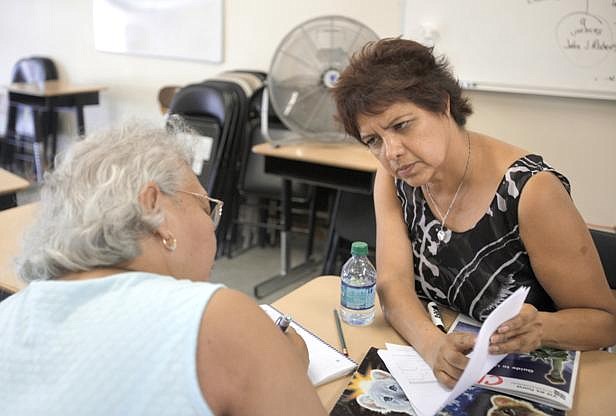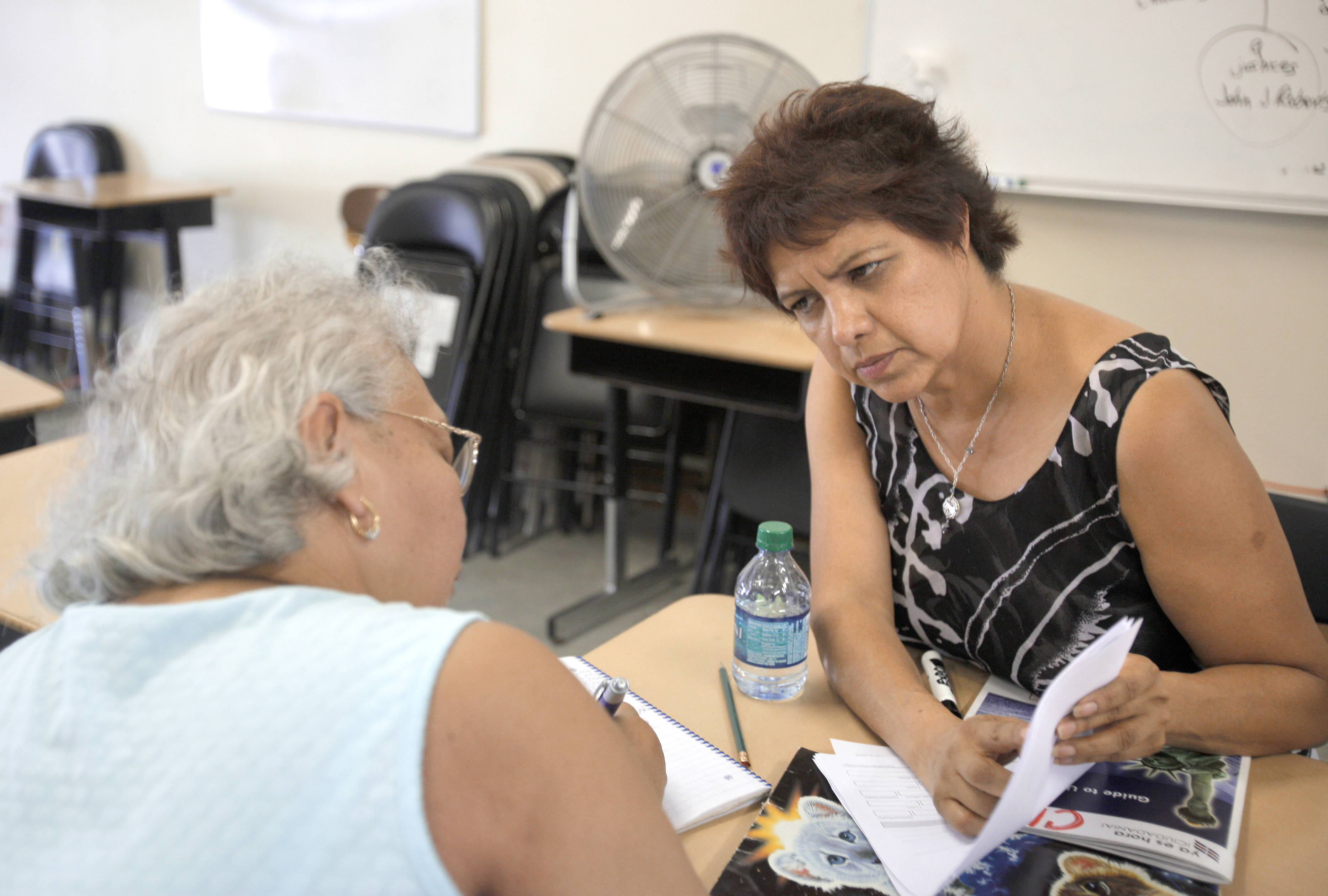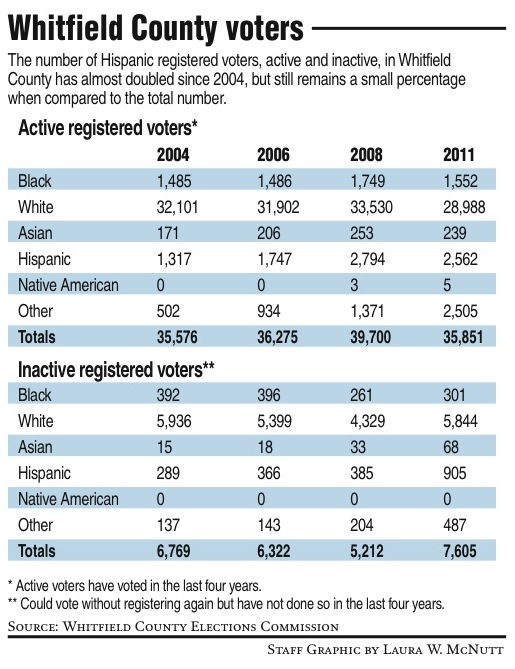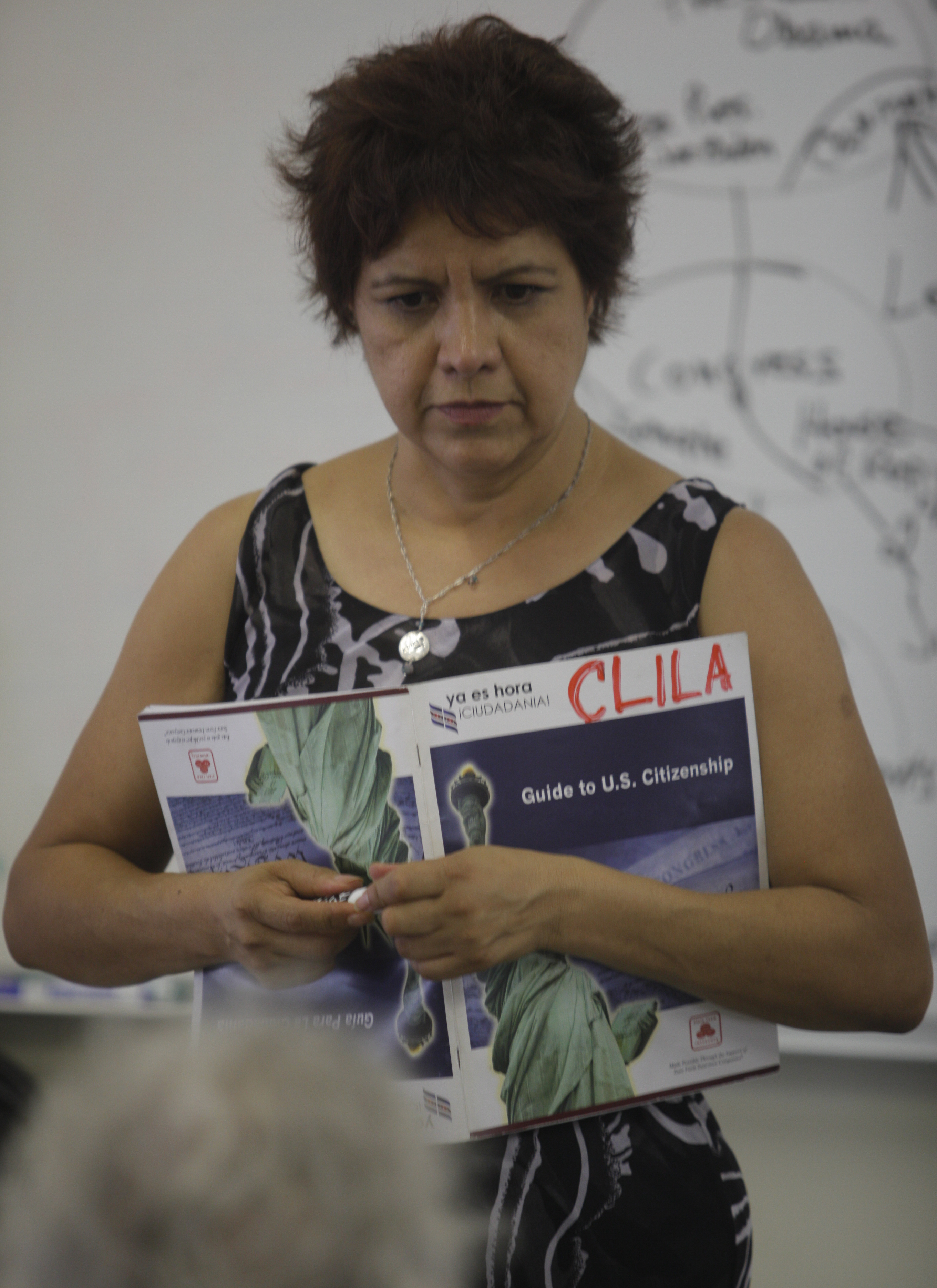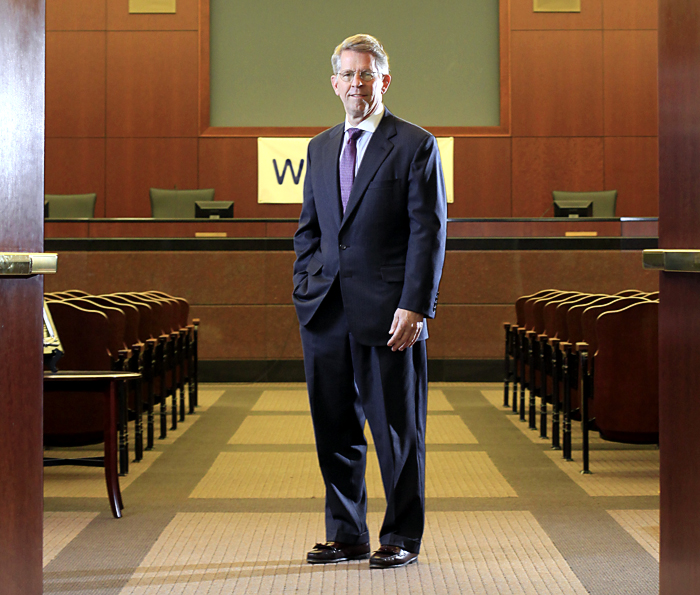Hispanic voting bloc grows in Whitfield County
Friday, January 1, 1904
DALTON, Ga. -- Angela Amaya sat in an old school desk with her Pirates of the Caribbean notebook on hand, ready to learn about United States history and civics.
In the 99-degree heat just outside the office of the Coalition of Latino Leaders, no air conditioner and only a couple of fans, Amaya, 57 and an El Salvador native, practiced the name of the president, the vice president and election cycles for the exam she needs to take to become a U.S. citizen and be able to vote in local elections.
The number of Hispanics registered to vote in Whitfield County has almost doubled since 2004, but remains a small percentage when compared to the total population, numbers that follow a state and national trend.
Nevertheless, the growth in the Hispanic voting bloc in Whitfield County and Georgia has been substantial enough that it could spell the difference in a close local or statewide election, experts say.
And Amaya wants to become part of that growing bloc.
"When you are a citizen, you can vote and elect your representatives," she said.
Nationwide, the Hispanic population grew by about 43 percent from 2000 to 2010, said Mark Hugo Lopez, associate director with the Pew Hispanic Center in Washington, D.C., but in states such as Georgia, it nearly doubled to more than 852,000.
In Whitfield, almost 32 percent, or 33,000 people, out of 102,599 residents are Hispanics.
But that doesn't necessarily translate to votes or even registered voters.
There are 35,851 active registered voters -- those who vote at least once every four years-- in the county, out of which almost 29,000 are white, 2,562 are Hispanic, 1,552 black and 2,505 "other."
Hispanics could change the face of elections in the city if they registered and voted in large numbers, according to Dalton Mayor David Pennington.
"The voter turnout is so pitiful, if they [registered Hispanic voters] voted, they could elect the entire school board, City Council and mayor," Pennington said, but turnout has been as little as 10 percent in some elections.
Nationwide, the number of Hispanics who are at least 18 and U.S. citizens -- people who can cast a vote if they want to -- has grown to more than 21 million, said Lopez. In 2010, 6.6 million of them actually cast a vote, he said.
"But one interesting thing is that, with each election cycle, more Hispanic voters have voted," he said. "There were about a million more voters in 2010 than there were for example in 2006."
America Gruner, president of the Coalition for Latino Leaders, a local organization that works with the Hispanic community, said the Hispanic population in the area is still very new and voting is not always one of their top priorities.
"A lot of times their priorities are to establish themselves, find a job, a house, basic necessities," she said.
Amaya said she's been a permanent resident for 10 years, but it wasn't until recently that she made the time to study for the citizenship test because she's on disability. Permanent residents can apply to become U.S. citizens after five years, or three if they are married to a U.S. citizen.
"Not many people get involved [with the elections]," said Amaya. "Not because they are not interested, but because people work too much."
Lopez said Georgia is behind other states in part because many Hispanic residents aren't U.S. citizens or 18 yet.
"It's a very young population as well," he said. "So even though Georgia has one of the nation's 10th-largest Hispanic populations, it actually doesn't have one of the nation's 10th-largest adult voter-eligible populations in the country in terms of Hispanics."
Gruner said her organization started registering people to vote and offering citizenship classes in 2006. In the last five years, they've registered almost 600 people, with a record 300 in 2008.
And since 2006, about 275 people who have participated in the classes have become naturalized citizens, she said.
adding up the numbers
Jerry Gonzalez, executive director of the Georgia Association of Latino Elected Officials, a state group that also has a campaign to register and encourage Hispanics to vote, said state figures may undercount the number of registered Hispanic voters.
As of January 2009, about 150,000 Hispanics were registered to vote, according to figures he compiled.
But numbers from Georgia's Elections Division show that, as of Aug. 1, 2011, there were only about 94,000 Hispanics registered to vote, less than 2 percent of total registered voters in the state. Close to 393,000 registered voters were under the "other" ethnic or race identity category.
Gonzalez arrived at his number in 2009 by combining the state's Hispanic voter totals and a surname match to capture those of Hispanic origin who identified themselves as other than Hispanic. And today the number of registered Hispanic voters is bound to be higher based on the population increase, he said. And even if the numbers do seem small, he said the growth rate has been "astounding," going from 10,000 in 2003 to the 150,000 in 2009.
People like Dalton's Aradio Mendez, a 63-year-old Guatemala native, are deciding to get more involved as a result of tougher immigration laws.
"The laws are meant to be for the undocumented but at the end affects us all," said Mendez, who came to the United States 22 years ago and has lived in Dalton since 1991.
enough to matter?
The growth in the Hispanic voting bloc is enough to make a difference in a competitive statewide election, said Gonzalez, so "it's no longer the point where the Latino electorate can be ignored in Georgia."
But Dalton State political science professor Ken Ellinger disagrees.
"Hispanics and every other racial group are a tiny subset of voters, especially when you talk about people who show up regularly to vote," he said. "People know that close to 50 percent of the population [in Dalton] is Hispanic and I think they tend to assume that almost half the voters are Hispanic, which is quite obviously not the case."
Georgia also makes it harder to register and to vote, said Ellinger, which affects everyone.
"Georgia has always had low voter registration and low turnouts," he said.
In Dalton, people can only get the voter registration form at the courthouse, said Ellinger, and Georgia cuts off registration 30 days before the election, longer than any other state in the country.
"Now we are one of a handful of states to require photo ID," he said, and a 2009 state law requires first-time voting applicants to provide proof of U.S. citizenship.
Less than half of Whitfield County's citizens are active registered voters, and Pennington pointed out that even fewer vote in any given election.
Last year during the congressional elections, Pennington and others led a drive to get out voters, running ads and distributing yards signs in an attempt to raise participation. In the end, about 22 percent of registered voters participated, a large increase from previous years, he said.
"The numbers are horrendous; there is complete political apathy here," Pennington said. "People gripe, but most people just don't care."
The same apathy carries over to people running for political office. Out of the four elected officials on the Dalton City Council, the Dalton mayor and the five-member County Commission, only three were opposed in their last elections.
As an elected official, Pennington said low voter turnouts have repercussions not just for the people running for office.
"It's important to us, regardless of who you vote for," he said. "The people in Atlanta and Washington are looking at voter turnout. They look who votes and, if you don't vote, they don't care about you."
County Commissioner Chairman Mike Babb said commissioners have tried various tactics to encourage people to attend meetings and be more involved in their local governments. So far the efforts have been without success, he said.
People who don't vote or attend public meetings generally are not as well informed about their local government, Babb said.
"We'd love for people to get involved and educate themselves," he said. "It might help them to see that this is a thinking process; we don't just pull these decisions out of thin air."
Contact Perla Trevizo at ptrevizo@timesfreepress.com or 423-757-6578. Follow her on Twitter at twitter.com/Perla_Trevizo.
Contact Mariann Martin at mmartin@timesfreepress.com or 706-980-5824.
